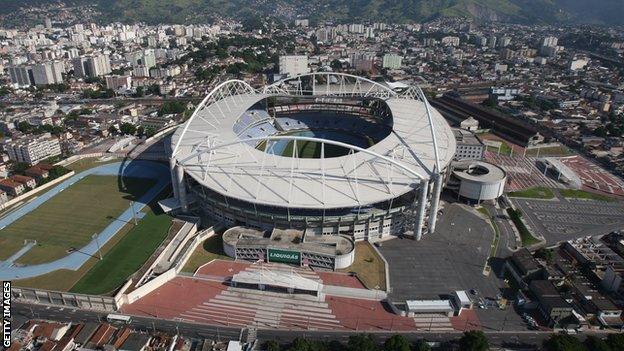Rio Olympics 2016 stadium 'will not be demolished'
- Published

The mayor of Rio de Janeiro has said the stadium due to host the athletics events at the 2016 Olympics will not be demolished, despite structural problems that have led to its closure.
In a TV interview, Mayor Eduardo Paes said he closed the Joao Havelange stadium on Tuesday because of a risk of the roof collapsing.
Further studies were needed to find out what had caused the problem, he said.
The stadium is to remain shut as a safety measure until further notice.
Mr Paes said he took the decision after receiving the latest of three surveys about the structure.
"It says there is a risk. Our priority here is to protect the lives of the people, that's why we closed it," Mr Paes told Brazil's Globo TV channel.
The report presented to the mayor said the stadium was at risk of collapse from wind speeds of 60km/h (40mph).
'Confident about Olympics'
The Engenhao stadium, as it is known in Brazil, has been used as Rio's main football venue, while the iconic Maracana stadium is renovated for next year's World Cup.
Despite the indefinite closure of the Engenhao, a spokesman for the Rio 2016 organising committee told the BBC he was confident that the stadium would be ready for the Olympics.
The mayor of Rio, Eduardo Paes, said: "If it takes a month, then it will stay closed for a month, if it takes a year, it will stay closed for a year."
The stadium was built six years ago and hosted events at the 2007 Pan American Games.
Since then, it has been leased to local football club Botafogo.
It is scheduled to host athletics events at the Rio Olympics, but the opening and closing ceremonies will take place at the city's Maracana stadium.
Its construction was massively over budget, costing the state $190m (£125m).
Contractual issues led to the company that started the project leaving before it was finished.
The latest setback could make recouping the earlier losses difficult, Mr Paes said.
The mayor said that if the cause of the roof problems were found to be due to bad construction work, the companies that oversaw the completion of the project would be held responsible.
However, should the problem lie with the project itself, then the City Hall would be forced to shoulder the costs.
The closure is an embarrassment for Brazil as it prepares for two of the biggest world sporting events, say correspondents.
The authorities have also acknowledged delays in work on the Maracana, and funding problems have also beset a stadium in Sao Paulo, which is set to host the opening match at the 2014 World Cup.
- Published27 March 2013
- Published14 August 2012
- Published24 November 2010